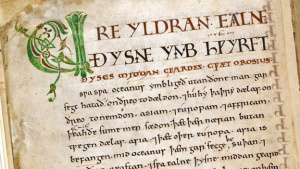Language/Old-english-ca-450-1100/Grammar/How-to-Use-Be
Hi Old English (ca. 450-1100) learners! 😊
In this lesson, we will learn how to use the verb “be” in Old English. Understanding how to use “be” is essential for building sentences in Old English, and it’s one of the most commonly used verbs. We’ll also look at some cultural and historical information to help contextualize the language.
So let’s get started!
Finish this lesson and explore these related pages: Pronouns & Gender.
The Verb "Be"[edit | edit source]
The verb "be" in Old English is "bēon" or "wesan". The latter is more common in the later period of Old English (900-1100). The verb has several forms depending on the subject of the sentence: I, you, he/she/it, we, you (plural), and they. Here's a table showing the different forms:
| Person | Bēon | Wesan | |||||||||||||||
|---|---|---|---|---|---|---|---|---|---|---|---|---|---|---|---|---|---|
| I | eom | - | You (Singular) | eart | bist | He/She/It | is | bið | We | sindon | - | You (Plural) | sind | - | They | syndon | - |
It's important to note that "is" in Old English not only means "is", but also "am" and "are". Similarly, "bist" can mean "art" and "are".
Let's take a look at some examples:
| Old English (ca. 450-1100) | Pronunciation | English | |||||||||
|---|---|---|---|---|---|---|---|---|---|---|---|
| hwæt eart þū? | /hwæt æɑrt θuː/ | What (are) you? | ic eom gumena dryhten | /ik eom ɡumenɑ drɪhten/ | I am the lord of men | se beorn ne is hēr | /se beorn ne is heːr/ | The warrior is not here | heora wif syndon gode | /heorɑ wif syndon ɡode/ | Their wives are good |
Here's a dialogue to help you see these verbs in context:
- Person 1: hwæt eart þū? (/hwæt æɑrt θuː/ – What (are) you?)
- Person 2: ic eom gumena dryhten (/ik eom ɡumenɑ drɪhten/ - I am the lord of men)
- Person 1: se beorn ne is hēr (/se beorn ne is heːr/ - The warrior is not here)
- Person 2: heora wif syndon gode (/heorɑ wif syndon ɡode/ - Their wives are good)
Cultural Context[edit | edit source]
Old English was the language spoken in England during the Anglo-Saxon period, which lasted from the 5th to the 11th century. It was spoken by the Anglo-Saxons, who were Germanic tribes that migrated to England from what is now Germany and Denmark. The use of the language declined after the Norman Conquest in 1066, when English became influenced by French.
Old English literature is rich in poetry and prose, with masterpieces such as "Beowulf" and "The Anglo-Saxon Chronicle." These texts gave us insight into the cultural, religious, and societal values of the Anglo-Saxons, who were a pagan people before converting to Christianity in the 7th century.
By learning Old English, you’ll have a deeper understanding of the English language and its evolution. It can also help you appreciate the literary, historical, and cultural heritage of England.
Practice Exercises[edit | edit source]
To get the most out of this lesson, it's essential to practice what you’ve learned. Here are some exercises to help you reinforce your knowledge of how to use the verb “be”.
Exercise 1[edit | edit source]
Fill in the blank with the correct form of “be”.
- I _____ a farmer. (eom)
- _____ you happy? (eart)
- The church _____ beautiful. (is)
- We _____ tired. (sindon)
- _____ they hungry? (syndon)
Exercise 2[edit | edit source]
Translate the following sentences from English to Old English using the verb “be”.
- My name is Peter.
- She is a student.
- Are they here?
- We are tired.
- Is he a musician?
If you want more exercises, visit the question section of the Club website.
I hope this lesson has been helpful! Remember to keep practicing and exploring the fascinating world of Old English. Don't forget to check out the questions and find native speakers at the Polyglot Club. Have fun learning!
➡ If you have any questions, please ask them in the comments section below.
➡ Feel free to edit this wiki page if you think it can be improved. 😎
Other Lessons[edit | edit source]
Sources[edit | edit source]

